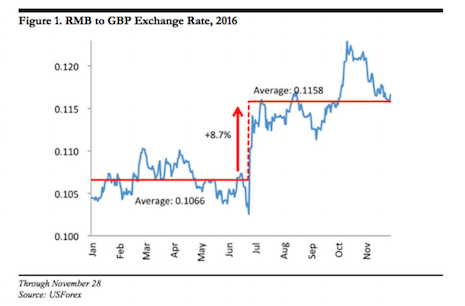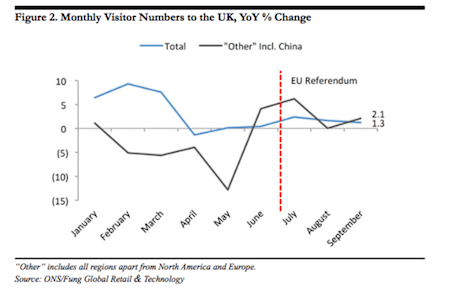Chinese travelers' spending on luxury goods in the United Kingdom rose significantly after the country voted to leave the European Union.
This data comes from Fung Global’s new report on Chinese travelers in the U.K. The report found that the number of visitors from China to the U.K. has steadily increased over the years and Chinese spending on luxury goods while abroad saw a sharp increase in the wake of the Brexit vote and the subsequent depreciation of the British pound.
"This is no longer simply about the move to ecommerce. Even the highest-end luxury brands now admit they must offer their products for sale online," said Deborah Weinswig, managing director of Fung Global Retail & Technology, New York. "It is about meaningful and permanent shifts in how and where shoppers buy luxury goods."
Travelers abroad
After the U.K. voted to leave the European Union, uncertainty sent the British pound spiraling.
While the citizens of the U.K. were still reeling over the surprise win for the Leave campaign, international travelers seized on the opportunity, with the depreciated currency making the country a more attractive destination for tourists.
Additionally, the depreciated pound has meant that spending while abroad in Britain has become more appealing as well. Among no group is this more prevalent than the Chinese traveler, a frequently studied group in luxury research given their propensity for making large purchases while abroad.

Favorable exchange rates are fueling the surge in travel
In 2015, 325,000 Chinese residents traveled to the U.K., an increase of almost 40 percent from the previous year. However, in 2016 growth was negative for the first half, but after the Brexit referendum, travel increased.
In September, Chinese travelers increased their tax-free spending in the U.K. by 25 percent. During China’s 2016 Golden Week in October, spending jumped an additional 58 percent while the number of transactions rose by 30 percent, suggesting both more purchases and larger baskets.
Travel from China to the U.K. remained strong from Golden Week until the end of the year, particularly around the holiday shopping season.
The average Chinese traveler spent $1,783 in the U.K. last year, as opposed to just $1,678 in 2015.
Depreciation
The global luxury market is expected to bounce back this year with predicted growth of 2 to 4 percent, according to a new joint report from Altagamma and Bain & Company.
This growth can be attributed to a healthy desire for luxury goods from Chinese consumers, many of whom buy their luxury products internationally. Additionally, increased consumer confidence in Europe is also driving luxury's growth (see story).
The United States will likely also feel some of the benefits, with more Chinese travelers spending there as well. This will be helped along by the recent introduction of popular Chinese mobile payment services WeChat Pay and Alipay to North America.

The number of visitors from China has increased
The move comes at the behest of Citcon, a cross-border commerce company, China Luxury Advisors and The Momentum Group, a marketing agency that works with WeChat. Together, the three are hoping that Chinese travelers will soon be able to use WeChat Pay and Alipay while abroad in the United States, easing the purchase of international luxury goods (see story).
While Brexit may still be a large question mark for the U.K., it is an exclamation point for Chinese travelers looking for luxury goods while traveling abroad.
"Empowered by connectivity, luxury shoppers enjoy a profusion of choice and are equipped with more knowledge than ever. In this e-book, we explore how luxury shopping is changing," Fung Global Retail & Technology's Ms. Weinswig said.
{"ct":"Z3KflSzuXwipX4kANrqud3vdzW16hP19UUhaSekp16D\/p3EyS7J+ZCQ4EfZn6RYT2gQCvH3SXopRLV2B4Pudp9zEubwgiv2aMYnfXRWRJENjX9gjdSbQaXYFgmF0LtciR5zcWzPU2lbUYP3S4Gr7OtXNnLD1Okc1E7Y8QjU4BBHeKVZH4rgCGfw0PLf312Yl\/cDgRcNXK+eFO03ZJWuLtEG\/eMnCw5F\/fvp4Fgebre0tdtayZHAwcFkrKlt9Ut16nXgDtwrL0Ht5iaCSY3R+3Ig\/gaM04g6gtBF2qcSipfB7d3AAy8oZRjvtYounCQl2YlLQFKAvLzdwSLuUFDzMzIE8d5Gcsc66jheneQyPLiXVHwRP5O10TYmXZMbubzOoMlOSPwiprZLHx36BHdMZWRgjAksmSu2G+S9hhrlrqsnWP5syH3hnf5h0YZU\/JaMokPSnNW5+NAiRmrmvuzhiJM90oW+\/WKPB9\/O1xXKR3YsHIsXCjPkKiCo9J\/tpR7MfCReJI3TLpyYSy9g\/+hoo+WSPWT2V63YGZ0EPooB3ltDPquVo0M6jyTxTr3bExHt5i8PKIppElNk0oB5HYX0aCNxGGffmhzCOWZI1bc+BNPkClBop6bOfoanR+haOtaaRUj7tqT0\/Hx9B3FgWIGp9uecB\/AoYUFFV95PL7Q2jYIwaT1CbH6iHKVcE7nd4oRiN0MSBUBDbmNJIhnE0mXfNu2aSfGUCNGkRg7ogl5OfLVWSXaE7KafgA9an4xy5slfG4hEkrxbIVjNe+04EwwN6YBO29R8rlIMm3ZZerNQj1pWScSKNrfQbfpwUp2hAGlmJ1EyHvnaH+8d9uXDfPFo4XIheQXgWvs+0j4AE+nwE7d+pWu4Qw0iK3FdlgGcC487dTEJ+V5aybHTwRTl0Mr9F38h+KH4\/DxJv\/6PawQMvZjA6iTsmLQNUHGcv2MXX02fTKOrVO99YRoO03Q6mFZgghVhGZ1y+jol\/\/G9FZ1OySurNhc4JGZJOebfQx5IuGY8ute2CQftssE19hy7PjlBwPfWXIsCmocVdSNv\/582H917hhEi7JJTAPSQuaSOLTSIShIAlra2IQwmrFVMBu9I5I7xI5oo1CO6bg6eMrVmfnozF7RrR6drNkM1H39lhesG8gTxic9WPmFSOw2GyLVMkEbrU1lGX9qgfH7jQJwMjU8QbZL6R8sXCNVl7n8TVeu8SdQV\/oYRmYqbgPJXyqlvZQ8yHsflrBdbuftsBwUFQRdg\/L4Zh6LqSNfoebWEAOB7cl4IMIEnsyGfRoJymyGlg3B02B2rozzRjGcaQ2G\/MM4sWWYqCky6rdEeNyV\/7Hk1f5cu4InQS3MFdZFXPiQkIlxLtVpIDZUOk1syhmJYB3xXnLCuwaQYr4iyIdRIEN50HW4e0h1fdc\/LGh+dX7APpJW8rFZqaveihJJv7EMBr\/hDyfJaOasNgNwgqUHqxY5M9ep70Y0KgethZTXaOu9jgp5BKRiU6SuyMPFu7NNtrfpSTYD89LPpRteQWMqu3rD\/coAoa0TBlsru1JDOto\/6XvyUsgi+OBhNhcdOH\/B6Bch2dp1J6siIQsXAApQMaxdzngAZ0v25ZAEazKlBlz5bZkEaFE+n6Ek4TB6Nyzke5VFxZjEt8+QlXrF8LZ+QX4S5j0Fk2sXs8VPOlFUAxJ3HPKeO6\/674R5aEVDgRU2AMZS8A39BPpH8jyMW7zxZ9ICv8gOrq49v7PxzA4nwH6l6\/K1JKG6tLtdDjl0iE7NGwgnQRfOow6kq3LdJ381aEOViRJE5rLUkz3OMybzVifbxmYKwR3+Ksg4KcpzsWzQKmrQx6xMp8BJn+f0LiqVcFLKJO530Giapm5zueddKSWriCxZkr4KoR7yvfj0FmbMie3Zga1rUrwcuAz5q2RqVW90uHuZisCaO3gsiNPWLEKl7\/roE49aTvQb+uaNx\/Gl3ptKqnuTyU\/+KbsFVxa1Bm118Bnegbd9KrTDIrSt1ZTnYe06vshGUMLkkq6HvlZ6RTgl77iBGRRLktJHzB3ObQWYhlnv9gdyMsb+DDQZIxfbVaNzwn8TogV4s3xzIyiCAs5yXZp6\/QZFfntyfl0pMw5sD0yuvwVuhsS3nNMq185qaROFyuUzIJvynmDiTQAGFSlOndehH6C0t4sLFU1HAxoIudA2+9waOoaVIZlD9XXNxuGayfBwCXsdtsqOKW\/teTjyR\/Rcp9gGXs25Asr\/MA7VyKc1zvvmnvLYaPNRl3Xv6qEJWmXTZIEiXvEzjfdRuV5Qq\/eLRVCqS741KztyaYun9xSFx+f7+FzvwbL\/i0RjIvz7BIX6H8kYC1QWyBB52BlGe3iBP93YUSXvyFnN46tAVQSsVdKuC79ix+EfvNpeua7ErA2yoas2OyM6z9S9GeYQbhwhuss6fZgjZGcCTjn7BFr7fIDLAf+i23LuGmMkbGKv5jigia69eu4WSjhqnH6tU4hDjAM+aYrccNsfWqm8x\/VOiCzXk38inITsCDw97wNM1FOiRylIRNBn7amGXU546We3pkMNh2rP2KplXMcUrO+DbGS5MJ3FPuNuyjyzh02q2rAip+urZtSsBU9PxvYJ9VF+GNXUMzAiKS\/nQHwj6KSHOAjZflda5BQpuhKoq2TF6HtRn3mpxphFu+wtTrNG3\/94OsRPRVtLpA+5QCRkGUPhsVjhrmnBwCFECi2qFnz11XqRMG0WzJ8FSPE2zmSHuqceMu\/0SlclFAoIO75ai\/GFDPeg7\/JCxqXRuij8KQRL0cR0S7rOLMP448yea4Nc3XHAhPYVld2Pnkm72ggC7TOFCEmH+FdEb6vquc5dQKU+L06lZ87N15sCPeF\/uBpM81Bb+8l66bHCcC+cQLCu8OhnAI8HJRH+3jeOmy1TLvTESPPGF\/HX9sNqN\/CO5epxp2WzPJCvuAtJDAS7Wo4q0AEoeC8AWxI6e21odlGntbok5HToLWFpkuaBoRAnC6QXMSUCOVEfy6yJe75hGVJZjzhY1IPz8XqbVQpR+Z\/lIjCes9e575d290jvWbhce\/Xhl1sAz7D+795SOMPEgxy79Q99h6ra1tuzyb2JYYWccPa1\/GTuIOjlut3zf42EOzzzyY3ep+MFu02dCWX2zDRfLHd5zwgdMKV4+bW\/8pGRN7bdNF9WHYzVd80toUpYjgL1sbka3rgKAG2Ua8wJh0HQmRs91zgwG4CSPtMa13l350P1jf6hPrtT79dq02SAt+1iX13q7fnaa4JXvfA5mUE8Y8+i0EW1A5zKiXqXk1VNUDpjAdAcwLQ1aEGCrvDNO9Ow0z+8ktePs0GGZ7rCGEPwNCzC\/sVgd1QxF9\/zu3n3n2IQvUr7sWJ8R\/WgN7Fcvyr3CtL5MnDo1QUrxEddtyywzZDttlzJFF6X3cyQgcEZvPFuUl5apQTQ7WmArLbEKOkzlprFISqX+bxhEWgNVfPYgKPEXcSOW5fOZbQGs2dGsnehyAZ+P4LWJYdt2xuv0ZD1LvADhf4NJL9CdYXSGxKsMKyiSAjiNUm+QiFgEXl\/Glb3twT74dxOdC7nUn86MOSAHra5jry8\/u4gzbCh5JtffaOL9d4J48KslD4oH92xtScv5TWUjQNbh5q8GETeagyEQRvsiKSKLftsiXPCdvXCU1R1hDD5EYBLAfkek1YV29fnAVTtjO9kEB\/bum+zlJ2zLusrDmJsipumt0BBuXi9LefpYSlzzuxAGk64HT5HKtDTa4Jtq0XormI0sae5nhdMhrfv6GI0qBOjABqD\/6GmHzCFejAr8MbmEhacwnJ1yJrEr\/xtsDsLNdri94F5VmNMvwc1NgFiOUm8S6nFS+uF0DuDLqv\/e7ORMV\/YR4J+TMAxL8W2aSxxZMFGVKV0Xid2\/gQ79CDuJEN86p39ot2UjWYodlDnOVcOfHQal00PtohazUn8sSlGTiMioNp8fcv4RGC0oeUyq6\/CM4WAEad8aYQoy5gNrcyGk8k0LKvZKlaompYIsDsLpLaBaiXns36ri0bGJjtC5N9GdF527jsxY4qS5gjjKV4gRqBLU7SkWn9oMhDVeezlHe8XTHPGiRWwbIgxTFlO8iduwXoRRCgHFHDr\/e+8c4+bYZM37lzcuc9YEYaFijl\/+9uTyz0wiEx9MIBJq5rIM5vH81hE2DKBP+OZFwcjy\/35x9Xm7aJ\/dRYLYmmun29+mr6DFvudGBDxUc3Ec\/EW64d6EhsF9XzS6pItKeRA93EDTcCFSX8ypnMeoUYnBU\/o2\/nDizfUx8+XANyXGoc1nMEaGTrO\/NixhLldAX4bcBQPgsEgHi33yVUyaf1fDn\/Z3TG0kOVGk9LZRD6l0gyfq1yzJRxhWdhvVFbmoyE+JsA6vX4so4wK3zhSrLA8B2tU+KT2cYyiN5xQEZBBwU9QnhKM81YUEEDHG+klA64+9N6Hdtt9zDdAgrZV3Tf+QCCqmfVvKOsIRjjUpkyJkSaRqqVEOTk\/obRSjL1uMlesDQO0b2oZXu3Qt0WTHbsR5n2sOxsNVjkOOLVMJcr8DQ2XQHvwxT+4rfQty0\/nLGLxV8H3goSBlnZs7rKCozNnsNbwWOrRXrSumT0dbQ4KSX4D9MHJY0nmPSa\/gtNSl3Jp88Dkdi+k\/RdZpCU4Bdn3+BgQglGQHI2IU0pbtEPyDyvPh4V+9JjT7VDBMJ67sff4CvDz6mfz\/41f4conabvrJVW82fv7aw0RZHOOOhJwfMgq2aYiFBfA4ML6f8AB7zdkSnJ7IWJGD8RzWw7w2jQrBQYG9\/5USs3TtgXKtRWpKH0Kvz4anDl4KcishxbAv5lh\/sFnJFH7OkpmUyS+zYZzXSCv+wL2VAeS0ZvfOCfrqg373wcAVA8eWaUJPhoA0ZfqetZk2R9e0F\/m1xq+UzKfuXCcPvwxk1yFvpRxaycwzMLZAPS\/XTDUYIWlM3c7\/TKmz\/+1TlTUe1\/jkXWj3chVAkzyvt44YBz6nWUktzPiafTXFvCgD3baN67x\/GRxhYN1gYsCj\/ll489w9UyDltnfQ0kY0gsDfAcC+d7f3pOK4gugagI3J5ktcpfCE56ZLpN3KCZZskTAd1DxxiMk5zd0Q3p3KgG7wRYHLLfjBCQoygMUufFmhl23l+p8JsfWGh1w\/ZoKV9MQJd\/pZx\/SUVlKgPhAo7nWYY3DfLSCfIW6C7TIkbtPFUqJsVQRaWhp0hwRt5KhvQX1a4FZQkCx8c7YcUUzCN+SaKWWfrgThM2DV7JbROqABAjIO3wLNnnIz1P9ivXtOmQJc1nKwLUb1PvNp4yhDdGEDIY6JxVsAUhg+RSJgt10jp3Ir7t2Mi+Jrte78HPvELkErNG1g7VB8Zd44B4MqsJ7ozwcFjc\/0mVcrR+OeTx9f522pkUYOUlwrAJbm8d+HO43UdUHvvRcgHx1GNPTfKAjiUSLQMdlRLtYVyudpaW4SjqhAaQc\/yQvLYl5EHz3q0951zdXorSeCuQF0+UnjAwjQyGtxgwBwvhdc8xC6SS8YJjuZaheDpD3oHPiMCuRR2vNWw0U03wI7+cFaMow3xRyR11WWwM9ALSenU826o8F8O3PBq2914vU8Rd19N7VrnzA6NpIzFAaeiLTc3UXTR26mw2EzAuPXDtwKG18a88pS9i+Ccl9mcwhQBTcCx1mXydnTjffB+VK\/FfTBFGV70e1eLPc2fNSriZPyD4J4uSLSpl88XRahJ2mF1uZLv4nCZMFvc0yiKiqIz7xYENwBfxOp+GJCjhM8kDaUh1Cbz3rSAoMu4dMGaMKbILxH5lSO+aWT3bPd1GSY4+\/hWCf2g1Aadx0fnN0lml6AfghXCFhwvo9UAsYZfvflRIQ9GnZOhTcaQWYetkAuzo+JtP0irNbhS34DT1ID0YSLBBeedNdWVt4svRn\/bcgNTtvjT\/Za7uw4jrfMoVxPfj6UvMk6vequ3B1XWbIkre0\/PxfsAhAwegqndio4u1jEWsiwJkyoT20K94Gcd7bu3hleyOJ6Rq4EYe+WX2oA4OVm5EUvYqzaC1llC2\/73RT+MMtIqQ1wL8CVHes0KPJWyN5ejGQ7zWU58rzPMj7vuLeoBbOnEVb7WQN+cVgWyLMCTVPXj\/VVrdsnUtBnxlpdcDjxQOfZcGc2+9L1CDgb4w0pKoeeOdR1kWGDMcw5t5qqC21OlT4Z1eYGuep3WqMKlhTyy5pOTOgnlE6B6hBBj3MFsk4cGbniKNmpZP79MxDKr\/2sEXc00lXtOKEjTByl+wCLcdFsx5Bwey\/NtB5fQXkPyl3IjQ6ges\/hWBKHYY4qjj1n\/DIEzSCd+7ETNAE96CsaYQUVCNaOtlaQg+btMvtXBYzudsbkDZsMQ57Og62i2IMO4ApWpfaqR4g\/phrQVm8OzMYbWFKDLH7kHHqA5G3yMvV2d26jhQ2pXWbakVVVb9KNAr4RN6B9sabWyHuMs4vucUzAeq7j5Dr8ilr\/vsMx1RRedoyBiyHJNrCGJ4P9cnK6sMx6zO0Wqd+uJVp1TpmuRVDTuTaMkOMHMWHVSb3+hgkUBSWqWz3G5925vG5Pc5ZpRnTgjo1\/q\/0gPynu8BGI9YqSO7sXc\/8a6ZfVNFveCTwVEqS\/UqbnqbNphcFsVjxKo8uH+OhN6h0eBfemG4djbBdymhjkCTtOGlYe8f3D5vYa\/knVzeS8cpX8WWNWKkp1kQ+eb\/gZdxvats3Zs6nsWRPOrF7xrjPspOPvl8Y5Xjq0oJx4S+GDAklwWahgrCRf0l7DZE06nSxeuWnebLH43lCBSTQT3Jk7HdOtNlhpvWwH43p\/1MeSkai\/n9a3hLPUHfbO4ElLEOYdUtaxixmvy5EWpuGMl8SN8aR\/Gqax9go5dtomiZcHlKa4nk7syn8V0l2QAkyylefl5PQ==","iv":"b8b10ee1b3e3d1e04f0c9209bc498b3f","s":"afdaae8f695a6e0c"}

 Chinese travelers are flocking the UK after the Brexit vote, due to favorable exchange rates of the depreciated pound
Chinese travelers are flocking the UK after the Brexit vote, due to favorable exchange rates of the depreciated pound